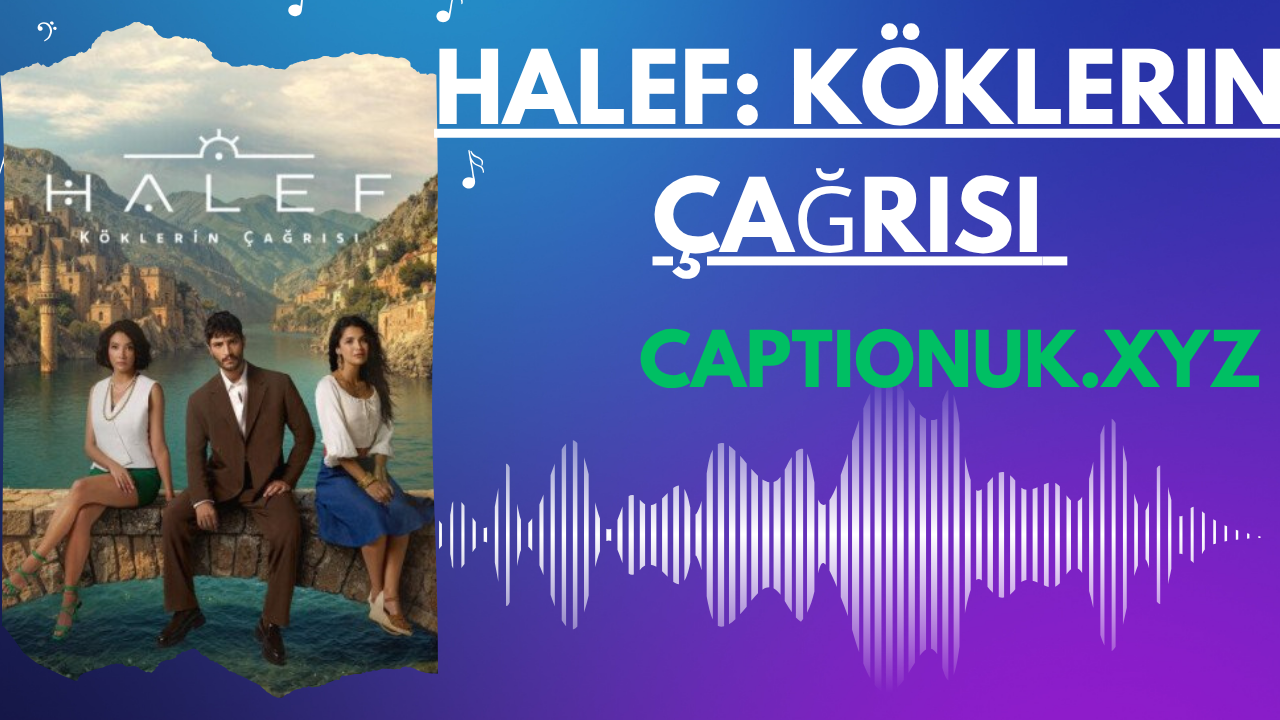Halef: Köklerin Çağrısı – A Turkish Series Rooted in Emotion

Introduction
Some dramas grab your heart from the first scene. Halef: Köklerin Çağrısı is one of them. It’s not just a show; it’s a quiet reflection on where we come from and what shapes who we become. Every episode feels like looking into someone’s soul.
The series explores deep emotional connections, family roots, and the silent battles people fight when returning to their past. In simple terms, it’s about identity, memory, and belonging things we all face in our own ways.
What’s Halef: Köklerin Çağrısı About?
Halef: Köklerin Çağrısı tells the story of a man named Halef, who returns to his childhood village after many years away. What begins as a short visit turns into an emotional journey of rediscovery, forgiveness, and confronting buried truths.
Halef’s story begins in the city. He’s modern, distant, and practical until one phone call changes everything. His father has passed away. When he returns home to arrange the funeral, he finds more than memories. He finds questions he never dared to ask.
The show unfolds slowly, using silence as power. Each scene captures emotion without many words — an old habit, a glance, a familiar street corner. The past feels alive.
The Central Themes
This series thrives on emotion and reflection rather than action or suspense. Let’s explore its key themes in plain, clear language.
1. Roots and Identity
Every person has roots where they come from and who shaped them. Halef asks what happens when we forget those roots. The show reminds us that even if we move far away, our past never lets go.
For example, Halef feels like a stranger in his own home. The old trees, the family house, and even the smell of the fields bring back memories he tried to hide.
2. Forgiveness and Regret
Another major theme is forgiveness. Halef’s relationship with his father is at the heart of the story. It’s complicated, cold, and unresolved. Through flashbacks, we see the hurt between them.
The series doesn’t preach. It simply shows how time runs out before some words are said. It asks a simple but powerful question: Can we forgive someone who’s no longer here?
3. Silence and Emotion
Unlike many shows full of noise and dialogue, Halef: Köklerin Çağrısı uses silence as emotion. A single moment of stillness says more than ten lines of dialogue.
The music helps too soft, haunting, and slow. Each note carries the weight of the unspoken. Viewers don’t just watch; they feel.
4. The Conflict Between Past and Present
Halef’s city life contrasts with his village roots. The show paints this difference with beautiful detail technology vs. tradition, noise vs. calm, progress vs. peace.
He struggles to fit in either world. In the city, he’s too quiet; in the village, too modern. This tension reflects a truth many people face today: we live between what we were and what we’ve become.
The Characters
The show’s emotional pull depends on its characters, each carrying their own emotional scars.
Halef (played by Burak Deniz)
Burak Deniz delivers one of his strongest performances yet. He doesn’t speak much, but his expressions carry pain, longing, and confusion. You can sense his struggle without needing an explanation.
His quiet performance makes the audience feel like they’re walking beside him observing, not judging.
Halef’s Father
Though he dies early, his presence shapes the story. Through flashbacks, we see his strict love and his silent disappointments. He’s the shadow that follows Halef everywhere.
Halef’s Mother
She’s the emotional anchor. Torn between love for her son and loyalty to her late husband, she represents the generation that endured without complaint. Her scenes bring a quiet sadness that lingers.
The Village People
Every villager adds a layer of reality the neighbor who gossips, the friend who stayed behind, the teacher who remembers Halef as a boy. Their small moments create a living portrait of the past.
Cinematography and Setting
The show’s beauty lies in its simplicity. The rural setting old houses, dry fields, and soft sunsets feels alive. You can almost smell the soil.
Each frame looks like a painting. The camera lingers on faces, empty roads, and the play of light through dust. It makes the ordinary feel poetic.
The color palette is earthy brown, green, and gold. It reflects the show’s theme: memory doesn’t fade, it changes hue.
Why It Stands Out
Most Turkish dramas focus on love triangles, revenge, or high drama. Halef: Köklerin Çağrısı takes a quieter route. It’s emotional, reflective, and honest.
Viewers connect because it mirrors real life. Everyone carries some regret. Everyone wonders what could’ve been said or done differently. That’s what makes the story hit home.
(Insert stat: Reference ratings from Turkish media sources or IMDb. Example: “The show holds an IMDb rating of 8.7/10 and ranks among the top 10 Turkish dramas of the year.”)
The director doesn’t rush. He allows scenes to breathe. You can feel the wind, the silence, and even the tension between words unspoken.
Music and Symbolism
The soundtrack deserves its own praise. It’s soft but heavy with emotion like a whisper you can’t forget.
The recurring flute theme plays whenever Halef faces a memory. It’s his emotional thread. The show also uses simple symbols keys, letters, and an old family tree to represent connection, secrets, and legacy.
(Insert audio clip suggestion: The series’ main theme music or background score.)
Every symbol ties back to one message: we’re all products of where we come from, even when we try to run away from it.
What Viewers Are Saying
Fans online describe the show as “deep,” “slow but powerful,” and “emotionally honest.” Many say it feels like therapy not because it solves problems, but because it understands them.
People connect because the series doesn’t tell them what to feel. It lets them feel in their own time.
Where to Watch
You can stream Halef: Köklerin Çağrısı on popular Turkish streaming platforms like BluTV and gain access to English subtitles.
(Insert infographic suggestion: Step-by-step visual guide — “How to watch Halef: Köklerin Çağrısı with English subtitles.”)
If you love quiet dramas that speak through emotion rather than dialogue, this one deserves your time.
Conclusion
Halef: Köklerin Çağrısı isn’t about fast-paced action or loud moments. It’s about the spaces between — where emotion hides. It asks who we are without our roots and what it costs to face the past.
Through strong performances, poetic visuals, and quiet storytelling, the show proves that silence can be louder than words. For anyone who’s ever looked back at their past and felt something stir inside — Halef will speak directly to you.
FAQs
1. What is Halef: Köklerin Çağrısı about?
It’s a Turkish drama about a man returning to his childhood village after his father’s death. There, he faces old memories, family secrets, and emotional wounds that never healed. It’s about identity, forgiveness, and roots.
2. Who stars in the series?
The main role of Halef is played by Burak Deniz. Supporting cast members include seasoned Turkish actors who bring depth and realism to village life.
3. Where can I watch Halef: Köklerin Çağrısı with English subtitles?
You can stream it on BluTV or similar Turkish streaming platforms. Many episodes are available with English subtitles, making it easy for international viewers to follow and enjoy.


